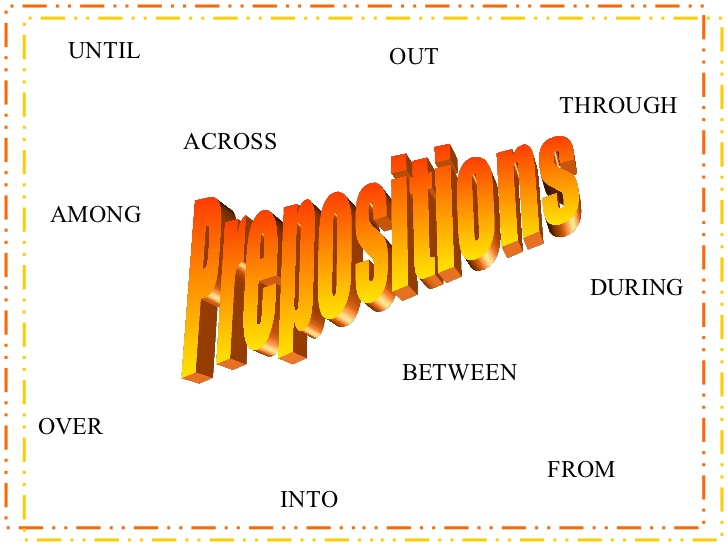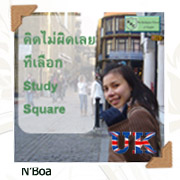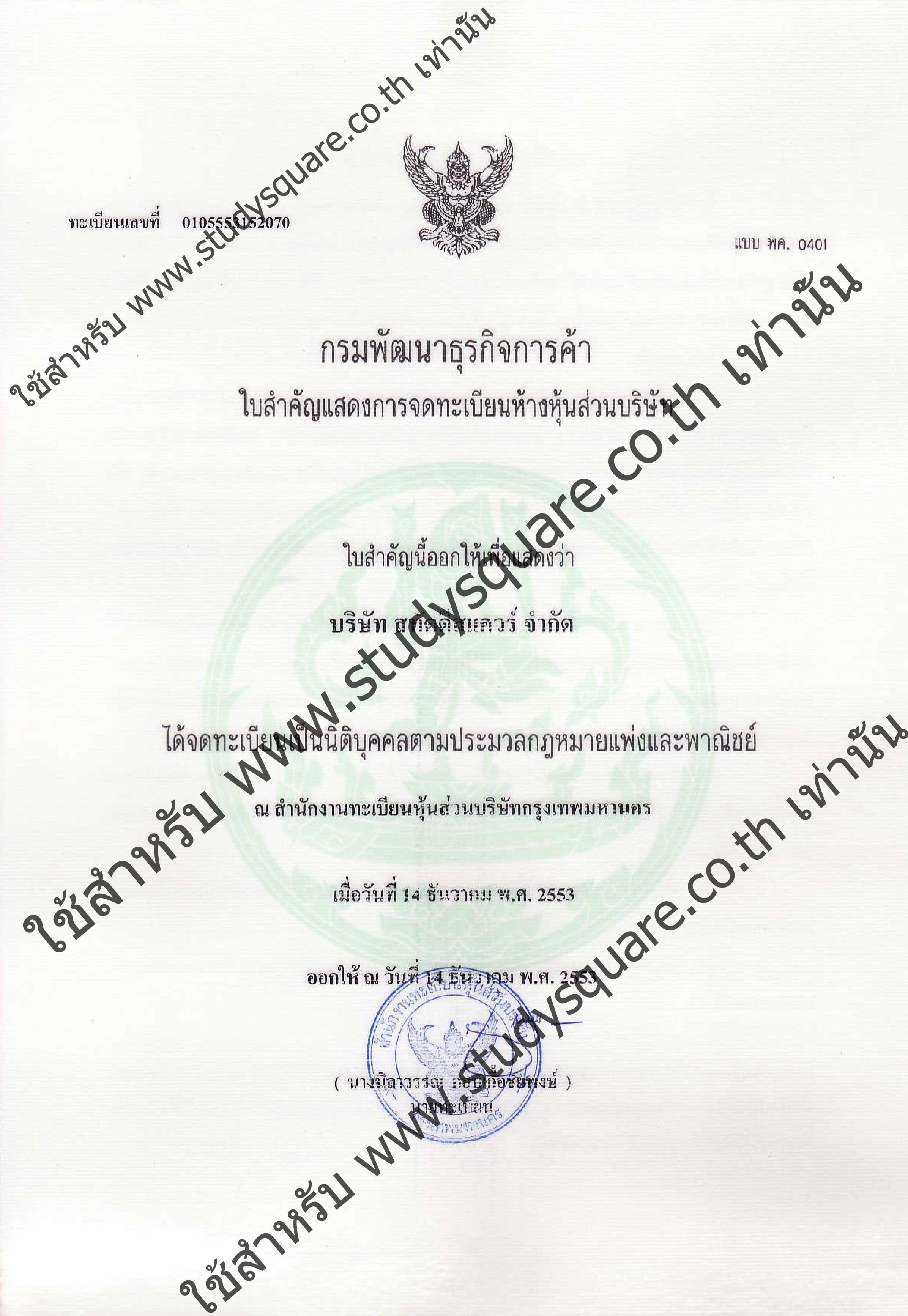 Preposition คือ คำบุพบท ได้แก่ คำที่ใช้แสดงสถานที่ ตำแหน่ง การเคลื่อนไหว ทิศทาง เวลา ลักษณะ และความสัมพันธ์ คำบุพบทในภาษาอังกฤษอาจเป็นคำคำเดียว เช่น at, between, from สองคำ เช่น next to, out of, across from หรือสามคำ เช่น in front of, in back of, on top of เป็นต้น คำบุพบทตามด้วยคำนาม คำสรรพนาม หรือกลุ่มคำนาม/นามวลี (noun phrase)
Preposition คือ คำบุพบท ได้แก่ คำที่ใช้แสดงสถานที่ ตำแหน่ง การเคลื่อนไหว ทิศทาง เวลา ลักษณะ และความสัมพันธ์ คำบุพบทในภาษาอังกฤษอาจเป็นคำคำเดียว เช่น at, between, from สองคำ เช่น next to, out of, across from หรือสามคำ เช่น in front of, in back of, on top of เป็นต้น คำบุพบทตามด้วยคำนาม คำสรรพนาม หรือกลุ่มคำนาม/นามวลี (noun phrase)
นอกจากนี้ ในการตอบคำถามเกี่ยวกับสถานที่ ตำแหน่ง การเคลื่อนไหว ทิศทาง เวลา ลักษณะ และความสัมพันธ์ หากเป็นการตอบแบบสั้น ต้องใช้คำบุพบทนำหน้าประโยคคำตอบด้วย เช่น
“When’s the meeting?”
“ On Monday.” ( ไม่ใช่ตอบเพียงแค่ Monday.)
1) คำบุพบทแสดงสถานที่ (preposition of place) ได้แก่ at, on, in
at ใช้เมื่อกล่าวถึงจุดหรือตำแหน่งของพื้นที่หรือเนื้อที่ที่มีลักษณะเป็นมิติเดียว ซึ่งบ่อยครั้งมัก
เป็นจุดในการเดินทางหรือสถานที่พบปะ เช่น
The coach stops at Phitsanulok and Chiang Mai.
Turn left at the traffic lights.
See you at the bus stop.
We enjoyed the party at your house.
at ยังอาจใช้เมื่อกล่าวถึงอาคารหรือสถานที่เมื่อเรากำลังนึกถึงสิ่งที่คนทำภายในอาคารหรือสถานที่เหล่านั้น เช่น
Busaba is a student at Sukhothai Thammathirat Open University.
Let’s meet at the restaurant.
I’ll drop you at the airport.
on ใช้เมื่อกล่าวถึงพื้นผิวที่มีลักษณะสองมิติ เช่น beach, ceiling, computer or TV screen,
grass, the page of a book, wall, roof, road, table, shelf เป็นต้น
I love lying on the beach.
Can you help me get rid of those dirty spots on the ceiling?
What’s that mark on the computer screen?
The rabbit’s sitting on the grass.
It’s on page 112.
I’d like to hang this picture on that wall.
There are a few cats on the roof of my house.
on ยังสามารถใช้เมื่อกล่าวถึงสถานที่ที่ตั้งอยู่บนเส้นหรือแนว ( places on a line) เช่น
on the Nile, on the equator เป็นต้น
The ancient town of Luxor is on the Nile.
Kenya is on the equator, isn’t it?
My house is located on Vibhavadi-Rangsit Road.
นอกจากนี้ on ยังใช้เมื่อกล่าวถึงยานพาหนะ เช่น bus, train, plane และ ship ยกเว้น car
I was on the bus when you called me this morning.
Guess who(m) I met on the train?
in ใช้เมื่อกล่าวถึงที่ ที่ว่าง หรือเนื้อที่ที่มีลักษณะสามมิติ เช่น box, city, country, cupboard, drawer, house, library, room, car, pocket, building, village เป็นต้น
What’s in the box?
I live in Bangkok, but my daughter lives in London.
How long have you been in Thailand?
Can you put the salt and pepper back in the cupboard, please?
The letters are in the top drawer.
Many students are now studying for their final examination in the library.
Your glasses are in the car.
It was very cold in the theater last night.
2) คำบุพบทแสดงตำแหน่ง (preposition of position/location)
เช่น above ( ข้างบน เหนือ) , across from ( อีกฝั่งหนึ่งของ) , at the top of ( ด้านบนสุดของ) , at the bottom of ( ด้านล่างสุดของ) , at the back of ( ด้านหลัง) , behind/in back of ( ข้างหลัง) , beside ( ข้าง ๆ) between ( ระหว่าง) , by ( ข้าง ๆ ใกล้ ถัดจาก ติดกับ) , in front of ( ข้างหน้า) , in the middle of ( ตรงกลาง) , near ( ใกล้) , next to ( ถัดจาก ติดกับ) , on top of ( บน ด้านบนของ) , opposite ( ตรงข้าม) , underneath ( ข้างใต้ ข้างล่าง) เป็นต้น
The light is above the desk.
She lives in the room across from mine.
I put your name at the top of the list.
Can I borrow the book which is at the bottom of the pile?
My husband likes to sit at the back of the cinema.
My son was hiding behind me while playing hide-and-seek with his friends.
The most comfortable chair is the one beside the window.
The little girl is sitting between her father and mother.
The big mango tree by the river was blown down last week.
There was a woman standing in front of me.
Henry was sitting alone in the middle of the yard.
My house is near Kasetsart University.
The nearest bank is next to that convenience store.
The secretary started piling the books on top of each other.
The fresh market is opposite the hospital.
I found the key I had lost underneath the newspaper.
3) คำบุพบทแสดงการเคลื่อนไหว (preposition of motion)
เช่น away, from…to, into, through, toward(s), out of เป็นต้น
We drove away after saying goodbye to everyone at the party.
The salesperson traveled from city to city.
The rescuers dived into the water to save the little girl’s life.
Mike traveled to New York in a 747 and flew through a storm.
To get to Pim’s house, we drove toward(s) Sathorn Road.
She turned and rushed out of the room.
4) คำบุพบทแสดงทิศทาง (preposition of direction)
เช่น across, along, up, away from, down, to, from เป็นต้น
Many people live along both sides of the river.
My daughter ran quickly into the house and went up the stairs.
I got very angry with one of my employees, so I just walked away from her to
calm down.
He turned to the right to look at the driver.
The loud noise was coming from that room.
5) คำบุพบทแสดงเวลา (preposition of time)
5.1 at ใช้กับเวลาตามนาฬิกาและในสำนวน เช่น at dawn, at noon, at midday, at night, at midnight,
at bedtime, at lunchtime, at dinnertime, at sunrise, at sunset, at present, at the moment, at the same time เป็นต้น
The appointment is at 10:30.
Jane works best at night.
I’ll see you at lunchtime.
I’m afraid he’s not here at present. Can I take a message?
We finished the test at the same time.
นอกจากนี้ at ยังใช้กับวันหยุดสุดสัปดาห์ ( weekend) และเทศกาล ( festival) ต่างๆ เมื่อต้องการ
กล่าวถึงช่วงเวลานั้นตลอดทั้งช่วง
Did you have fun at the weekend? ( ตลอดช่วงวันหยุดสุดสัปดาห์)
What are you doing at Christmas? ( ตลอดช่วงเทศกาลคริสต์มาส)
5.2 in ใช้กับเดือน ปี ทศวรรษ ศตวรรษ ฤดูกาล และสำนวน the first/second/third, etc./last week
In Thailand, the weather’s great in December.
I started work at STOU in 1985.
There was an economic crash in the 1990s.
Columbus went to America in the fifteenth century.
In winter, it often snows in England.
My family and I usually have our main holiday in the summer.
The school board meetings are in the first and third weeks of the month.
ขอให้สังเกตว่า เมื่อกล่าวถึงฤดูกาลเป็นการเฉพาะ ( อาจหมายถึงช่วงเวลาใดเวลาหนึ่งในฤดูนั้น) ไม่ใช่กล่าวทั่ว ๆ ไป จะใช้ the นำหน้าด้วย
นอกจากนี้ in ยังใช้ในสำนวนดังเช่น in the morning/afternoon/evening ในสำนวน in the night เมื่อเป็นการกล่าวถึงคืนใดคืนหนึ่งเป็นการเฉพาะ (มักใช้ในกรณีของคืนวันที่ผ่านมา) และในสำนวน in the past, in the future
We went to the Temple of the Emerald Buddha in the afternoon.
I had a horrible dream in the night.
What would you like to do in the future?
5.3 on ใช้กับวันต่าง ๆ ของสัปดาห์ วันที่ และในสำนวน เช่น on Monday morning, on Friday evening, on Saturday night, on the weekend, on weekends เป็นต้น
Annie’s baby was born on Monday.
His birthday is on March 5.
Are you doing anything on Saturday night?
What do you usually do on the weekend?
On ยังใช้เมื่อกล่าวถึงวันใดวันหนึ่งเป็นการเฉพาะในระหว่างเทศกาลหนึ่ง ๆ
There’s a party at Ann’s house on Christmas Day.
Do you have any celebration on Easter Sunday?
ข้อควรจำ ไม่ใช้คำบุพบทบอกเวลา in, on, at กับคำว่า today, tomorrow, yesterday และสำนวนบอกเวลาที่ขึ้นต้นด้วยคำบางคำ เช่น last, next, every, this เป็นต้น
Do you have any meetings today?
What did you do last night?
สำนวนที่ใช้กันโดยทั่วไปอีกสองสำนวนคือ in time และ on time จะมีความหมายแตกต่างกันคือ
in time หมายถึง ทันเวลา (ก่อนเวลา ก่อนกำหนด) ส่วน on time จะหมายถึง ตรงเวลาพอดี
5.4 before ( ก่อน)
We got there before anyone else.
Have you met David before ?
I had a job interview at an import-export company the day before yesterday .
The year before last , I worked as a volunteer in a school in Pattani Province.
5.5 after ( ภายหลัง หลังจาก)
I’ll be home after dinner.
It is a quarter after ten o’clock.
Can you come and see me again the day after tomorrow?
After Wednesday we will begin our vacation.
Paul got a job immediately after his graduation.
5.6 during ( ระหว่าง ในระหว่าง)
I’ll be really busy during the week.
I always wake up during the night .
The lights went out during the big storm.
The bride was so tired that she fainted during the wedding ceremony.
5.7 by ( ภายใน ไม่ภายหลังจาก/ไม่ช้ากว่า = no later than)
You must be in the office by 8:30 a.m.
The building will be completed by May.
Mr. Johnson should receive a reply to his letter by Tuesday.
By the time I finished one chore, my wife had thought up two more.
6) คำบุพบทแสดงลักษณะ (preposition of manner)
เช่น in, with, without เป็นต้น
He spoke in a low voice.
John is the man with gray hair and eyeglasses standing over there.
Our friends drove by without even waving.
7) คำบุพบทแสดงความสัมพันธ์ (preposition of relationship)
เช่น for, from, of, about, with, in เป็นต้น
She was sorry for him when he heard the truth.
Judging from Laura’s appearance, I would say that she is not happy.
Sarah could not think of the answer.
Could you please tell us briefly about yourself?
You can leave the package with my assistant.
She is interested in the plan.























































































ความเห็นล่าสุด